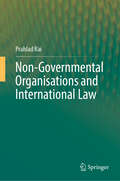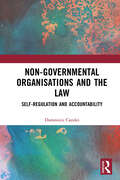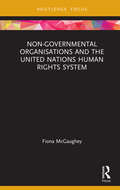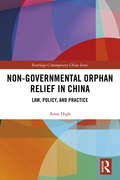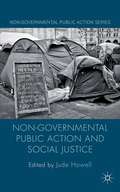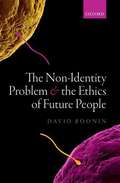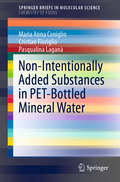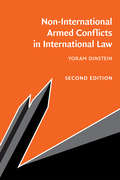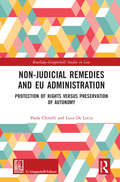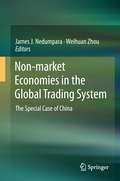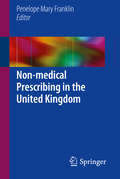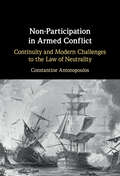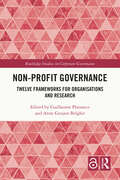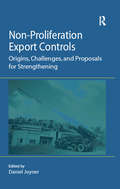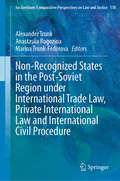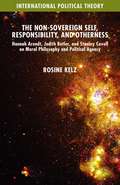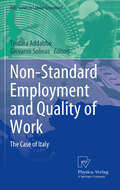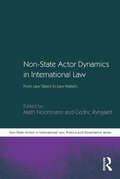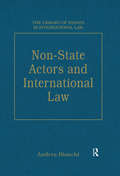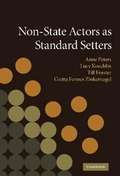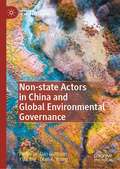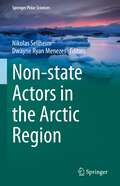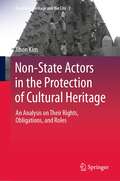- Table View
- List View
Non-Governmental Organisations and International Law
by Prahlad RaiThis book explores how non-governmental organizations (NGOs), with their sphere of influence within the State and beyond, enrich the international community by working on critical areas affecting people’s lives and expectations, to facilitate a more humanising international law. It provides ideas, highlights issues, and identifies actors, actions, and the scope of NGOs in international law. It charts possibilities and limitations of NGOs within the legal framework of a State and its evolution over the years. The book highlights how NGOs, having obtained 'consultative status' from the UN Economic and Social Council, have now extended their access and area of influence to international actors like inter-governmental organisations, international courts and tribunals. It provides an overview of NGO's performance and the important role they play in the making of human rights, protection of environment and business ethics. The book is primarily doctrinal containing case studies of important NGOs. The purview is an inquiry, analysis and overview of literature of NGOs in international law from a wide range of sources. The book will help shape the debate over power and functions of NGOs in the background of new loci of NGOs’ work. It is useful for students, research scholars, the NGO community, corporations' CSR departments, and concerned governmental agencies. Additionally, being interdisciplinary in nature, it caters to the demands of politics, sociology, management, public policy and social work apart from law.
Non-Governmental Organisations and the Law: Self-Regulation and Accountability
by Domenico CaroleiThis book examines accountability issues and the problems of regulating non-governmental organisations (NGOs) through self-regulation. It focuses on methods of self-regulation for NGOs in response to prominent scandals that revealed problems with their accountability, notably the ‘Mafia Capitale’ scandal in Italy and the Oxfam GB scandal in Haiti. It also touches upon other accountability failures, including the allegations against the WWF of facilitating human rights abuses of indigenous groups in Cameroon. The work brings a legal approach to the topic of NGO self-regulation and accountability, contributing to the academic and policy debate in several ways. It advances a brand-new theoretical model to explain the reasons behind NGOs non-compliance with self-regulation, examines the reasons for self-regulation failures, identifies new accountability routes, and recommends proposals for sectoral reform. The book will be of great interest to scholars, researchers and PhD students who work in the area of NGO regulation and accountability from a legal perspective as well as to accountability and NGO scholars working in other disciplines. It will also appeal to practitioners and policymakers who work on the development of NGO policies.
Non-Governmental Organisations and the United Nations Human Rights System (Routledge Research in Human Rights Law)
by Fiona McGaugheyNon-governmental Organisations (NGOs) have become important, although sometimes overlooked, actors in international human rights law. Although NGOs are not generally provided for in the hard law of treaties, they use the UN human rights system to hold Governments to account. A key way in which they do so is using State reporting mechanisms, initially the UN treaty bodies, but more recently supplemented by the Human Rights Council’s Universal Periodic Review. In doing so, NGOs provide information and contribute to developing recommendations. NGOs also lobby for new treaties, contribute to the drafting of these treaties, and bring individual’s complaints to the UN human rights bodies. This book charts the historical development of the NGO role in the UN. It examines the UN regulation of NGOs but the largely informal nature of the role, and an exploration of the various types of NGOs, including some less benign actors such as GONGOs (Governmental NGOs). It also draws on empirical data to illustrate NGO influence on UN human rights bodies and gives voice to stakeholders both inside and outside the UN. The book concludes that the current UN human rights system is heavily reliant on NGOs and that they play an essential fact-finding role and contribute to global democratisation and governance.
Non-Governmental Orphan Relief in China: Law, Policy, and Practice (Routledge Contemporary China Series)
by Anna HighBased on field studies and in-depth interviews across rural and urban China, this book presents a socio-legal analysis of non-state organised care for some of China's most vulnerable children. The first full-length book to examine non-state organised care of modern China's ‘lonely children’ (gu'er), this book describes the context in which abandonment occurs and the care provided to children unlikely to be adopted because of their disability. It also explores the various faith groups and humanitarian workers providing this care in private orphanages and foster homes in response to perceived deficiencies in the state orphanage system, in the context of a broader societal shift from ‘welfare statism’ to ‘welfare pluralism’. Formal law and policy has not always kept pace with this shift. This study demonstrates that, in practice, state regulation of these unauthorised care providers has mostly centred on local-level negotiations, hidden rules, and discretion, with mixed outcomes for children. However there has also been a recent shift towards tighter state control and clearer laws, policies, and standards. This timely research sheds light on the life paths and stories of today's ‘lonely children’ and the changing terrain of civil society, humanitarianism, policy-making, and state power in modern China. As such, this book will appeal to students and scholars of Asian and Chinese studies, law and society, NGOs, and comparative social and child welfare.
Non-Governmental Public Action and Social Justice
by Jude HowellThis unique collection explores the different organizational forms, strategies and tactics that activists adopt. The authors examine how established trades unions struggle to reform, how non-governmental public actors negotiate various dilemmas, and the efforts of non-governmental public actors to secure justice.
The Non-Identity Problem and the Ethics of Future People
by David BooninDavid Boonin presents a new account of the non-identity problem: a puzzle about our obligations to people who do not yet exist. Our actions sometimes have an effect not only on the quality of life that people will enjoy in the future, but on which particular people will exist in the future toenjoy it. In cases where this is so, the combination of certain assumptions that most people seem to accept can yield conclusions that most people seem to reject. The non-identity problem has important implications both for ethical theory and for a number of topics in applied ethics, includingcontroversial issues in bioethics, environmental ethics and disability ethics. It has been the subject of a great deal of discussion for nearly four decades, but this is the first book-length study devoted exclusively to its examination. Boonin begins by explaining what the problem is, why the problem matters, and what criteria a solution to the problem must satisfy in order to count as a successful one. He then provides a critical survey of the solutions to the problem that have thus far been proposed in the sizeable literaturethat the problem has generated and concludes by developing and defending an unorthodox alternative solution, one that differs fundamentally from virtually every other available approach.
Non-Intentionally Added Substances in PET-Bottled Mineral Water (SpringerBriefs in Molecular Science)
by Maria Anna Coniglio Cristian Fioriglio Pasqualina LaganàThis book discusses a major issue in the food contact materials industry: non-intentionally added substances (NIAS), and their impact on PET-bottled water. NIAS are chemical compounds that are present in food contact materials but have not been added for technical reasons during the production process, and consumers are usually unaware of their presence. NIAS can include decomposition or degradation products, impurities in the raw materials, unwanted by-products or contaminants from recycling processes, and they pose a challenge for packaging manufacturers.In Europe, the EU Regulations No. 1935/2004 and 10/2011 set out, respectively, the general principles of safety and inertness for all packaging materials, and rules on the composition of plastic food-contact materials. Among the plastics commonly used for bottled water and other non-alcoholic refreshment beverages, polyethylene terephthalate (PET) is the most favoured thanks to its chemical and physical stability, its transparency, low weight and good recyclability. Further, very few additives are used for its manufacture. Nonetheless, due to the complex formulations of polymers, processes and storage, NIAS can also be found in PET-bottled water, with potential cancerogenic or toxic effects.This book provides an overview of the European regulation of NIAS in plastic packaging materials, offering insights into their chemical composition in PET-bottled water. Lastly, it provides a useful discussion on NIAS and their toxicity.
Non-International Armed Conflicts in International Law
by Yoram DinsteinThis dispassionate analysis of the legal implications of non-international armed conflicts explores the rules regulating the conduct of internal hostilities, as well as the consequences of intervention by foreign States, the role of the UN Security Council, the effects of recognition, State responsibility for wrongdoing by both Governments and insurgents, the interface with the law of human rights and the notion of war crimes. The author addresses both conceptual and specific issues, such as the complexities of 'failing' States or the recruitment and use of child soldiers. He makes use of the extensive case law of international courts and tribunals, in order to identify and set out customary international law. Much attention is also given to the contents of available treaty texts. This new updated edition takes into account the latest events in terms of the practice of States, judicial pronouncements and UN Security Council resolutions.
Non-International Armed Conflicts in International Law
by Yoram DinsteinThis dispassionate analysis of the legal implications of non-international armed conflicts explores the rules regulating the conduct of internal hostilities, as well as the consequences of intervention by foreign States, the role of the Security Council, the effects of recognition, State responsibility for wrongdoing by both Governments and insurgents, the interface with the law of human rights and the notion of war crimes. The author addresses both conceptual and specific issues, such as the complexities of 'failing' States or the recruitment and use of child soldiers. He makes use of the extensive case law of international courts and tribunals, in order to identify and set out customary international law. Much attention is also given to the contents of available treaty texts (primarily, the Geneva Conventions, Additional Protocol II and the Rome Statute of the International Criminal Court): what they contain and what they omit.
Non-Judicial Remedies and EU Administration: Protection of Rights versus Preservation of Autonomy (Routledge-Giappichelli Studies in Law)
by Paola Chirulli Luca De LuciaThe increasing number of executive tasks assigned to EU institutions and agencies has resulted in a greater demand for justice that can no longer be satisfied by the courts alone. This has led to the development of a wide range of administrative remedies that have become a central part of the EU administrative justice system. This book examines the important theoretical and practical issues raised by this phenomenon. The work focuses on five administrative remedies: internal review; administrative appeals to the Commission against decisions of executive and decentralised agencies; independent administrative review of decisions of decentralised agencies; complaints to the EU Ombudsman; and complaints to the EU Data Protection Supervisor. The research rests on the idea that there is a complex, and at times ambivalent, relationship between administrative remedies and the varying degrees of autonomy of EU institutions and bodies, offices and agencies. The work draws on legislation, internal rules of executive bodies, administrative practices and specific case law, data and statistics. This empirical approach helps to unveil the true dynamics present within these procedures and demonstrates that whilst administrative remedies may improve the relationship between individuals and the EU administration, their interplay with administrative autonomy might lead to a risk of fragmentation and incoherence in the EU administrative justice system.
Non-Legality in International Law
by Fleur JohnsInternational lawyers typically start with the legal. What is a legal as opposed to a political question? How should international law adapt to the unforeseen? These are the routes by which international lawyers typically reason. This book begins, instead, with the non-legal. In a series of case studies, Fleur Johns examines what international lawyers cast outside or against law - as extra-legal, illegal, pre-legal or otherwise non-legal - and how this comes to shape political possibility. Non-legality is not merely the remainder of regulatory action. It is a key structuring device of contemporary global order. Constructions of non-legality are pivotal to debate in areas ranging from torture to foreign investment and from climate change to natural disaster relief. Understandings of non-legality inform what international lawyers today do and what they refrain from doing. Tracing and potentially reimagining the non-legal in international legal work is, accordingly, both vital and pressing.
Non-market Economies in the Global Trading System: The Special Case of China
by James J. Nedumpara Weihuan ZhouThis book provides one of the most comprehensive and compelling analysis of Non-Market Economies (NMEs) and their treatment under the current world trading system. In particular, it examines the treatment of China as an NME in anti-dumping investigations, especially post-December 2016. Central to this analysis is Section 15 of China’s Protocol of Accession to the WTO, which is the focal point of the controversy between China and other major WTO Members. The book highlights multiple perspectives on the interpretation of Section 15 and the Second Ad Note to Article VI of the General Agreement on Tariffs and Trade (GATT), which form the legal basis for China’s special treatment in anti-dumping proceedings, and provides unique approaches on interpreting the above treaty texts. In addition, the book explores recourses to trade remedy instruments other than anti-dumping to identify and address state-driven market distortions in the case of NMEs. Authored by leading practitioners and scholars, the chapters offer a detailed commentary and rich insights into the diverse approaches and methods used by anti-dumping investigation agencies of leading users. This book serves as an all-inclusive resource for discerning all facets of this issue, magnitude of the consequences, and potential threats to the delicate trading system. It is of particular relevance to economies-in-transition and newly acceding countries to the WTO. This book generates special interest among legal practitioners, exporters, trading firms, think tanks, academicians, policy makers and the entire community engaged in international trade disputes with China.
Non-medical Prescribing in the United Kingdom
by Penelope Mary FranklinThis book explores key developments in Non-medical Prescribing in the UK. Addressing the needs of countries in the European Market and beyond, which have been closely watching UK developments and would be interested in embedding or developing counterparts of their own. Featuring chapters by clinicians, leaders and practitioners in the UK Non-medical Prescribing arena, it identifies both current and potential future developments. Attention is paid to the different prescribing practices and governance within the four countries constituting the United Kingdom. Many lessons have been learned along the way and the purpose of this book is to share these lessons, tog ether with best practice examples in connection with the implementation of nurse/health professional led patient care, implementation of patient centered practice, and governance. Designated Registered Practitioners who have completed an enhanced training now receive a professional body qualification which enables them to prescribe within their scope of practice as Non-medical Independent Prescribers and, providing that they are competent, from anywhere within the British National Formulary independently of doctors; for Nurses, this also includes most controlled drugs. The book will be of interest to policy makers and to forward-looking professionals and practitioners in the diverse European Healt h and Social Care market.
Non-Participation in Armed Conflict: Continuity and Modern Challenges to the Law of Neutrality
by Constantine AntonopoulosNon participation in armed conflict gives rise to the relevance, role and content of the law of neutrality in contemporary international law. Despite scholarly opinion to the contrary the challenges posed by collective security and the prohibition of the use of force have not made neutrality obsolete. The validity of the law of neutrality is reaffirmed in State practice, mainly in the form of national military manuals, and the case-law of international tribunals. The legal framework of neutrality remains unchanged with respect to most rules. At the same time, it has been adapted to the evolution of the law of the sea as a result of the 1982 UN Law of the Sea Convention, the globalization of trade and the use of cyberspace in armed conflict. This has been achieved mainly through soft law documents and national military manuals. Neutrality, however, remains inapplicable in non-international armed conflict.
Non-profit Governance: Twelve Frameworks for Organisations and Research (Routledge Studies in Corporate Governance)
by Guillaume Plaisance Anne Goujon BelghitNon-profit Governance offers 12 perspectives and analytical frameworks to facilitate the development of governance in non-profit organisations (NPOs). In this sector, governance is all the more important because it is often voluntary. Organisations therefore need to be supported in their management, accountability, and strategy. International standards (in particular ISO 37000:2021, dedicated to the governance of organisations) propose key principles to ensure value creation around stakeholder engagement, leadership, risk governance, social responsibility, and organisational sustainability. This book proposes to explore and adapt these principles to the non-profit sector. To do this, the book focuses on four facets of governance: the controls it puts in place, the stakeholders it must listen to and manage, the performance it must monitor, and, finally, the people it must lead and mobilise. The book also highlights the interest of governance mechanisms and processes in developing effective performance, ethics in NPOs and responsible management. Each chapter therefore takes one or more of the principles of ISO 37000:2021 in the non-profit context and builds an analytical framework around them. These 12 frameworks can thus be used by the organisations themselves to develop their governance practices and by researchers who will find original approaches to incorporate into their studies.
Non-Proliferation Export Controls: Origins, Challenges, and Proposals for Strengthening
by Daniel JoynerThis volume provides a comprehensive and interdisciplinary examination of the Multilateral Non-Proliferation Export Control system and the national and international context within which it functions. Key features: "
Non-Recognized States in the Post-Soviet Region under International Trade Law, Private International Law and International Civil Procedure (Ius Gentium: Comparative Perspectives on Law and Justice #118)
by Alexander Trunk Anastasiia Rogozina Marina Trunk-FedorovaNon-recognized States are a widespread and politically sensitive de facto phenomenon in international politics, raising numerous questions from both a public international law and private law perspective. The present book deals with rarely analysed questions on how States deal with legal issues of private law arising with regard to non-recognized States and what issues of international trade and investment law arise in such cases. The book takes the non-recognized States that emerged in the post-Soviet area after 1990/1991 as examples, but also makes references to other non-recognized States. The book is written from a comparative perspective, giving room to authors from various States and non-recognized States (state-like entities) alike. Recent developments have led to the disappearance of three non-recognized States in the region. In this regard, the book may also be interesting as a source of information that has already disappeared or will probably soon disappear from the Internet. Further, the book is highly relevant for the remaining non-recognized States in the region, while also offering a source of inspiration for private law (including civil procedure) and investment law aspects concerning non-recognized States in general.
The Non-Sovereign Self, Responsibility, and Otherness: Hannah Arendt, Judith Butler, and Stanley Cavell on Moral Philosophy and Political Agency (International Political Theory)
by Rosine KelzDrawing on Hannah Arendt, Judith Butler and Stanley Cavell, this book addresses contemporary theoretical and political debates in a broader comparative perspective and rearticulates the relationship between ethics and politics by highlighting those who are currently excluded from our notions of political community.
Non-Standard Employment and Quality of Work
by Tindara Addabbo Giovanni SolinasThe international literature on non-standard employment has mostly focussed on its impact on employment, and more recently on working and living conditions. This volume explores these issues with special reference to Italy. Italy is characterized by very low participation rates (particularly women's), a high degree of fragmentation of labour contracts and a very intense non-standard work diffusion that make this context a particularly interesting case for analysis. New elements of discussion are provided with reference to the interaction of non-standard work, employment probability and living conditions. Interesting insights on the impact of non-standard work on the transition to stable employment and workers' careers emerge, suggesting a possible failure of companies' internal systems of work evaluation. The effects on labour productivity and on companies' performance are analysed. Within this framework, a new perspective on quality of work is suggested.
Non-State Actor Dynamics in International Law: From Law-Takers to Law-Makers (Non-State Actors in International Law, Politics and Governance Series)
by Cedric RyngaertNon-state actors have always been treated with ambivalence in the works of international law. While their empirical existence is widely acknowledged and their impact and influence uncontested, non-state actors are still not in the centre of international legal research. The idea that non-state actors are not law-makers, however, stands in sharp contrast with the growing notion of non-state actors as law-takers. This book examines the position of non-state actors in international law as law-makers and law-takers and questions whether these different positions can or should be separated from each other. Each contribution reveals both the political and normative aspects of the question as well as the positivistic possibilities and constraints to accommodate non-state actors as law-takers and law-makers in the contemporary international legal system. Altogether, each expert reveals that the position of non-state actors in international law is not a fixed one but changes with the functional and theoretical perspectives of the observer. Non-State Actor Dynamics in International Law is a welcomed addition to an under researched field of legal study. An indispensable read to scholars and policy makers wishing to gain new insights into general discourse on non-state actors in international law and the process of norm formation in the international realm.
Non-State Actors and International Law (The Library of Essays in International Law)
by Andrea BianchiThe expression 'non-state actors' has become part and parcel of the common parlance of international lawyers. Together with the traditional subjects of international law, such as states and international organizations, non-state actors play an important role in international law-making, law-adjudication and law-enforcement processes. Although the subjects/actors discourse takes place in a variety of contexts, most of the time the relevant narrative merely describes how different actors participate in the legal process in any given area. Little attention has been drawn to the theoretical discourse about non-state actors and its relation to the doctrine of the subjects of international law. Whether the solution lies in 'relativizing' the subjects or rather in 'subjectivizing' the actors remains open to doubt. The constant swing of the pendulum from the normative to the descriptive mesmerizes the observer but hardly hides the struggle for determining who may legitimately and authoritatively perform legally relevant acts on the international scene.
Non-State Actors as Standard Setters
by Anne Peters Lucy Koechlin Till Förster Gretta Fenner ZinkernagelThis analysis of 'globalised' standard-setting processes draws together insights from law, political sciences, sociology and social anthropology to assess the authority and accountability of non-state actors and the legitimacy and effectiveness of the processes. The essays offer new understandings of current governance problems, including environmental and financial standards, rules for military contractors and complex public-private partnerships, such as those intended to protect critical information infrastructure. The contributions also evaluate multi-stakeholder initiatives (such as the Extractive Industries Transparency Initiative), and discuss the constitution of public norms in stateless areas. A synopsis of the latest results of the World Governance Indicator, arguably one of the most important surveys in the area today, is included.
Non-state Actors in China and Global Environmental Governance (Governing China in the 21st Century)
by Dan Guttman Yijia Jing Oran R. YoungThis book is the first effort to develop a broad and deep perspective on the emerging space occupied by “non-state actors” in China in the context of global environmental governance. It will serve as a primer both for scholars seeking to understand China’s environmental governance system and for practitioners working with policymakers and administrators within that system. Individual chapters explore what works in achieving social change, domestically as well as globally, and will provide guidance to activists and directors of NGOs as well as scholars.
Non-state Actors in the Arctic Region (Springer Polar Sciences)
by Nikolas Sellheim Dwayne Ryan MenezesThis book comprehensively discusses the role that non-state actors play in the Arctic and assesses the normative role of these actors. Beyond any organised forum, there are actors that have a significant impact on the way the Arctic is developed, adjudicated, managed, perceived, presented and represented. This book complements the literature on non-state actors in international law and international security, world politics and international relations and provides a geographical account of their role for the Arctic. The book content is not limited to a specific discipline, but takes into account different approaches to the topic. This means that it contains three types of contributions: research articles, shorter research notes and commentaries. While the research articles constitute the main body of the work, it is also the research notes which provide an insight into issues related to the topic of the book.
Non-State Actors in the Protection of Cultural Heritage: An Analysis on Their Rights, Obligations, and Roles (Creativity, Heritage and the City #3)
by Jihon KimThis book provides a comprehensive overview of international cultural heritage law from the perspectives of non-state actors (NSAs). In keeping with the significant developments concerning the status and roles of NSAs in international law over the last century, NSAs such as communities, experts, NGOs, and international organizations have become important participants in the implementation of international cultural heritage conventions. Indeed, due to the emergence of new ideas on common heritage and cultural rights in the 20th century, international cultural heritage law has become inconsistent with States’ claim to sole authority regarding the protection of cultural heritage. The author analyzes the texts of international cultural heritage conventions, as well as their operational texts, to track essential changes in the rights, obligations, and roles of NSAs since the mid-20th century. Practical cases on the status and roles of NSAs are introduced to glean empirical ideas and facilitate an in-depth understanding of their effectiveness. The analysis reveals that NSAs do have certain rights and responsibilities concerning the implementation of cultural heritage conventions, and their roles have been increasingly recognized. At the same time, however, discrepancies between text and practice can be observed when it comes to the status and roles of NSAs. They have emerged for various reasons, one of which is the politicization of conventions’ governance. Adopting the standpoint of the NSAs, the book emphasizes the need to explore innovative and practical mechanisms that will allow NSAs to attain their proper status and take on practical roles under international cultural heritage law, which will in turn ensure the sustainable protection of cultural heritage. This message becomes more pertinent to the current conflicts where various tensions between states and NSAs have arisen and the roles of NSAs have become more important.Given its scope, the book will be of special interest to students, researchers and professionals at government and non-government organizations in the fields of heritage, the arts, law, administration, and development.
